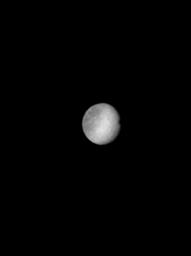
|
Rhea
- Click the image above for a larger view
- Full-Res JPEG (551 x 739) (6.7 kB)
- Full-Res TIFF (551 x 739) (19.7 kB)
Caption:
Broad areas of light and dark material seen in this enhanced Voyager 1 picture of Saturn's satellite Rhea suggest varying amounts of fresh ice on the moon's surface. A few small bright spots are visible and are similar in appearance to small fresh impact craters seen in Voyager images of the Galilean satellites of Jupiter taken at this resolution. The photograph, taken Nov. 10, 1980 at a range of 2.7 million kilometers (1.6 million miles), shows features about 50 kilometers (30 miles) in scale. Near the terminator (lower right) are several features which indicate topographic relief. The two circular features may be large impact craters perhaps a hundred kilometers (60 miles) across. (The extreme brightness of the southern (lower left) region is probably not real and is a result of image processing.) Rhea is one of the larger of Saturn's inner satellites with a diameter of about 1,500 kilometers (900 miles) and is known to be covered at least partially with water frost. It may be mostly icy in nature.
Background Info:
The Voyager Project is managed for NASA by the Jet Propulsion Laboratory, Pasadena, Calif.
Cataloging Keywords:
| Name | Value | Additional Values |
|---|---|---|
| Target | Rhea | Jupiter |
| System | Saturn | Jupiter |
| Target Type | Satellite | Planet |
| Mission | Voyager | |
| Instrument Host | Cassini Orbiter | Voyager 1 |
| Host Type | Orbiter | Flyby Spacecraft |
| Instrument | Imaging Science Subsystem (ISS) | |
| Detector | ||
| Extra Keywords | Crater, Grayscale, Impact, Water | |
| Acquisition Date | ||
| Release Date | 2000-05-23 | |
| Date in Caption | 1980-11-10 | |
| Image Credit | NASA/JPL | |
| Source | photojournal.jpl.nasa.gov/catalog/PIA02264 | |
| Identifier | PIA02264 | |
